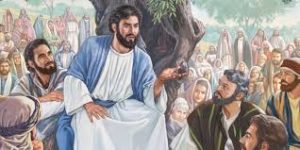Introduction to the Sermon on the Mount
Matthew 5:1-2 and Luke 6:17-19

As a unit, the Sermon on the Mount is Jesus’ interpretation of the true righteousness of the Torah in contrast with pharisaic Judaism. It clarified that the Torah did not merely require external conformity, but that it required both internal and external righteousness. So it clearly states the righteousness of ADONAI as demanded in the Torah. It is important to understand that the Dispensation of the Torah (see my commentary on Exodus, to see link click Da – The Dispensation of the Torah) did not end with the coming of the Messiah, it ended with the death of the Messiah. As long as Jesus was alive, all 613 commandments of the Torah had to be kept perfectly.
Conversely, as a unit, the Sermon on the Mount is not a constitution of the future Kingdom: If that were true, we would be required to keep all 613 commandments of the Torah. With the exception of its climax in Dw – The Narrow and Wide Gates, it is not a way of salvation: High moral standards will not get you into the kingdom of Heaven. Salvation is not on the basis of works; however, it is a moral code for those already saved. As a unit, it was not to serve as an ethical standard for believers during this Dispensation of Grace. Individually, it does say some things that become ethics for believers later on. But, if it were an ethical standard we would be obligated to keep all 613 commandments. Men couldn’t shave, you wouldn’t be able to wear clothes of mixed threads, and men couldn’t round off their beards, etc.498
Now when Jesus saw the crowds He went up on a mountainside, found a level place and sat down, which was the position of a rabbi-teacher in the first-century (Tractate Berachot 27b). Many had become true disciples as they chose to learn at the feet of their Rabbi from Galilee. The context here reminds us of the first giving of the Torah on another mountain – Mount Sinai.

Although Yeshua was speaking before a great multitude of people on the mountainside, His teaching about kingdom life was primarily for His disciples, for those who believed in Him. The Lord’s concern was for all of the people, and in hearing His teaching on the righteousness of the Kingdom many of them may have been drawn to faith. But, the principles He taught applied only to believers, for those principles are impossible to follow apart from the power of the Ruach Ha’Kodesh. A large crowd of His disciples was there and a great number of people from all over Judea, from Jerusalem, and from the coastal region around Tyre and Sidon (Matthew 5:1; Luke 6:17), who had come to hear Him and to be healed of their diseases. The mention of the great number of people points to the popularity of Jesus’ ministry at that time. The righteousness that Christ talked about and that of pharisaic Judaism was obviously much different. And aside from the healing aspect of His ministry, many people were thirsty for the internal righteousness that was obviously different from the external formality espoused by their religious leaders in Yerushalayim.
Those troubled by impure spirits were cured, and all the people tried to touch Him, because power was coming from Him and healing them all (Luke 6:18-19). Literally thousands of people were healed that day. There were no healing lines, no slapping of this one and patting of that one, not having people fall backwards and forwards. Those people whom Messiah healed did not have to do anything. Our Lord would even heal them at a distance. And the healings performed by Yeshua were genuine, and we have doctor Luke’s witness here to prove it. I don’t believe in faith healers, but I do believe in faith healing. Take your problem to the Great Physician. He is the best Doctor you can consult (and He doesn’t send you a bill).
He opened His mouth and began to teach them (Matthew 5:2 NASB). Matthew’s speaking of Jesus opening His mouth as He began to teach them was not a superfluous statement of the obvious, but was a common colloquialism used to introduce a message that was especially solemn and important. It was also used to indicate intimate, heartfelt testimony and therefore implied that Messiah’s sermon was both authoritative and intimate; it was of the utmost importance and was delivered with the utmost concern.499



Leave A Comment